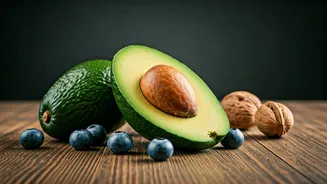Embrace the Basics
Longevity involves more than simply adding a few foods to your diet; it requires a holistic approach to nutrition. Eating a balanced diet becomes increasingly
important as we age. Nutrient-dense foods, the ones that are loaded with essential vitamins, minerals, and antioxidants, are crucial. Focus on consuming a variety of fruits, vegetables, lean proteins, and whole grains. This provides the body with the raw materials needed to repair cells, fight off diseases, and maintain optimal function. Staying hydrated is important for overall health; make sure to drink enough water throughout the day. Regular physical activity should also be an integral part of your routine. Exercise not only helps maintain a healthy weight but also boosts cardiovascular health, improves mental clarity, and supports healthy aging. It's also important to get enough sleep, as this is when the body repairs and rejuvenates itself.
Fatty Fish: Omega-3s
Fatty fish, such as salmon, mackerel, and sardines, are rich in omega-3 fatty acids, crucial for both brain and heart health. Omega-3s have anti-inflammatory properties that can help reduce the risk of heart disease, lower blood pressure, and improve cholesterol levels. They also play a vital role in cognitive function, helping to maintain memory and focus. Aim for at least two servings of fatty fish per week. The omega-3s are beneficial for the brain, helping with cognitive function as people age. These can also boost your mood and help stave off age-related mental decline. If you don't enjoy fish, consider taking a fish oil supplement to ensure you're getting adequate omega-3s. Be mindful of sustainability, choosing fish from sources committed to responsible fishing practices.
Nuts: Nutrient Powerhouses
Nuts are nutrient-dense powerhouses, offering a wealth of health benefits. They're a great source of healthy fats, protein, fiber, vitamins, and minerals. Studies show that regular nut consumption is linked to a lower risk of heart disease, certain cancers, and improved weight management. Include a handful of various nuts, such as almonds, walnuts, and cashews, in your daily diet. Nuts provide sustained energy and can help with overall satiety, making them a great snack option. Be mindful of portion sizes because of their calorie density. Opt for unsalted varieties to limit your sodium intake. Different nuts offer unique benefits, so incorporate a variety to maximize nutritional intake. Walnuts are rich in omega-3s, while almonds are good sources of vitamin E.
Legumes: Plant Protein
Legumes, which include lentils, beans, and peas, are essential components of a diet focused on longevity. They're a great source of plant-based protein and fiber, both of which are critical for overall health. Fiber aids in digestion, regulates blood sugar levels, and helps prevent heart disease. Legumes also provide a variety of vitamins and minerals. Incorporate legumes into your diet a few times a week, in soups, stews, salads, or as a side dish. They are relatively inexpensive and can easily be incorporated into many meals. Choose different varieties of legumes to provide a broader range of nutrients, and consider buying them dried to save money and reduce packaging waste. Legumes have a low glycemic index, which means they cause a slow and steady rise in blood sugar levels, making them a great choice for those with diabetes or those looking to manage their blood sugar.
Whole Grains: Fiber Boost
Whole grains, such as brown rice, oats, quinoa, and whole-wheat bread, are essential for heart and gut health. Unlike refined grains, whole grains retain their bran, germ, and endosperm, providing a complete package of fiber, vitamins, and minerals. Fiber plays an important role in digestive health, aiding in regularity and preventing constipation. Whole grains can also help control blood sugar levels and reduce the risk of type 2 diabetes. Replace refined grains with whole grains in your diet. Make sure that you choose whole-grain options for bread, pasta, and rice. Oats are a great choice for breakfast, while quinoa can be added to salads or used as a side dish. Whole grains provide sustained energy and help you feel fuller for longer. This can help with weight management. Look for labels that say "100% whole grain" to ensure you're getting the most benefits.












